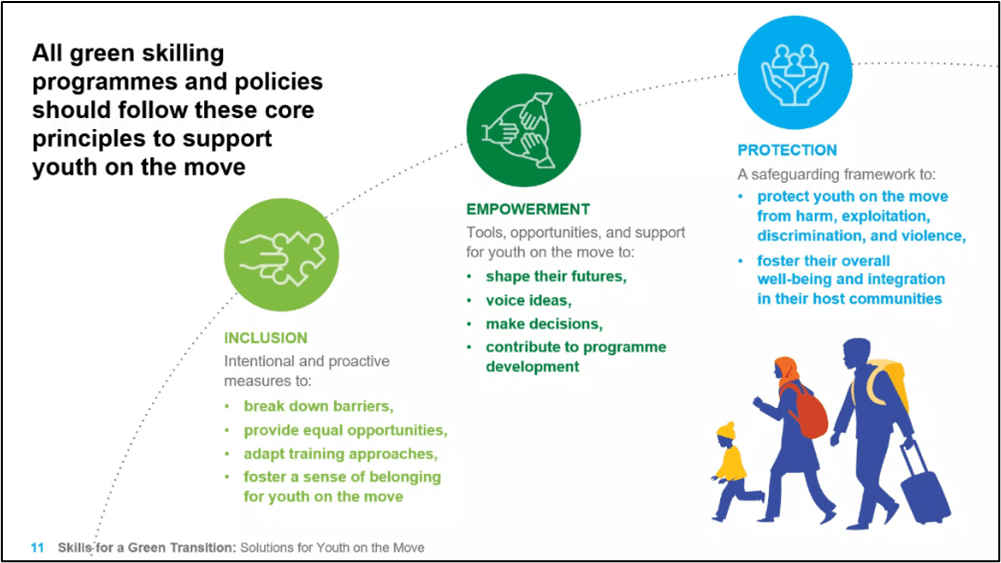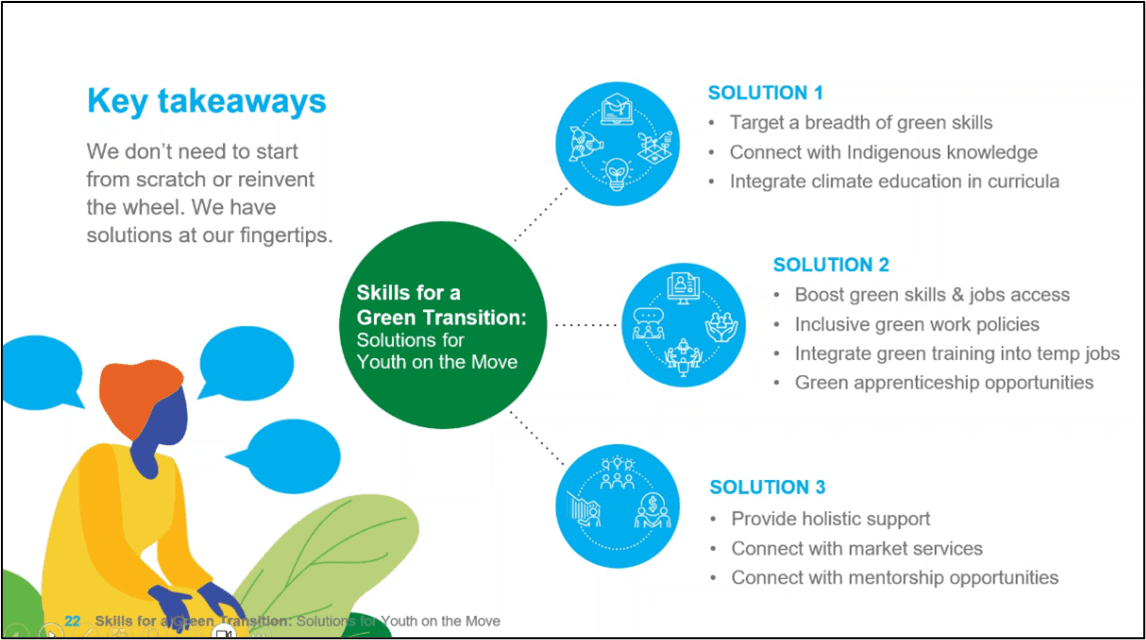On Tuesday 20 February, on World of Social Justice Day, UNICEF, ILO and the World Bank organized a virtual launch for the newly developed report “Skills for a Green Transition: Solutions for Youth on the Move”.
Partially funded under the PROSPECTS partnership, this report presents best practices and solutions for supporting youth on the move. The main focus is their access to green skilling opportunities, which allow them to create pathways for participating in the green economy. Only as such, the growth of green sectors and the subsequent change in workforce can effectively draw on the merit of young migrants, refugees, and forcibly displaced youth; properly including these groups in the ongoing green transition.
However, youth on the move remain overlooked in policy discussions and programming efforts related to this transition, whilst climate change exacerbates barriers to education and workforce development experienced by this growing population.
Aim of the Report
The report published on World Social Justice Day seeks to inform policymakers, program developers, international development partners and funders to support the development and implementation of policies and programs that promote green skills development for youth on the move, thereby accelerating progress towards a just, green transition.
Speakers during the launch included representatives from UNICEF, GenU, ILO, the World Bank, the Dutch Ministry of Foreign Affairs, and young people. Two youth representatives (and former refugees) presented their lived experiences from Kenya and Iraq, and the importance of green skills and jobs for their future livelihoods.
Nyabuol Biel, a Youth Advocate for GenU from Kenya, stressed the need for integration of climate education in schools: ‘’do not only provide financial support, but also make the right policies. Since we have youth in different countries relying on aid, it comes down to the right policies that young people have the right to work. Do not only create job opportunities, but also train young people.”
Additionally, Mujtabaa Alshawi – a Youth Climate Advocate for UNICEF from Iraq – emphasized that “high-income countries have a great responsibility, not only providing funds, but also supporting education and areas affected by climate change.” He highlighted U-report as a great example and tool for including the voices of young people.
PROSPECTS Partnership
Marian Noppert, senior policy officer at the Ministry of Foreign Affairs of the Netherlands, presented the PROSPECTS partnership. PROSPECTS regards a global partnership together with the Netherlands Ministry of Foreign Affairs, IFC, ILO, UNHCR, UNICEF, and the World Bank, which aims to improve the access of host communities and forcibly displaced people to protection, skills and education, and decent work.
Marian started her presentation with the fact that “the majority of the host population is around 21 years, and half of the refugee population is under 17 years” in the countries where PROSPECTS is being implemented. The need for specific approaches when it comes to protection, education, skills and decent work – especially in an environment which is increasingly being impacted by climate change – is therefore evident and urgent.
Marian went on to say that PROSPECTS build on ‘’successful skilling and employment programs from phase one, and further enhances these by working even closer with young people, and looking even more at integrating climate change adaptation.’’ Overall, this means that the focus of the program comes down to three things in particular:
- Providing green skills and jobs that will allow young people to adapt, transfer, and transport their abilities across different contexts;
- Greening infrastructure interventions such as WASH, construction and housing; and
- Further enhance social protection.
We Are Tomorrow Global Partnership
Next to PROSPECTS, Marian also presented the partnership between the NL and the “We Are Tomorrow Global Partnership”; a youth-led international partnership that seeks to empower young people around the world to realize meaningful participation on a national and international level and push climate action.
The importance of working together with young people was emphasized continuously, supported by examples of the work with our (1) UN Youth Representatives for Sustainable Development and (2) the Youth Advisory Committee.
Both of these groups provide advice on the development and implementation of international cooperation policy, such as the International Climate Strategy of the Netherlands. A fitting conclusion at the end of the launch: “We continue to keep Youth at the Heart of our work.”
Read the Green Skills for Youth on the Move report on the UNICEF website.

